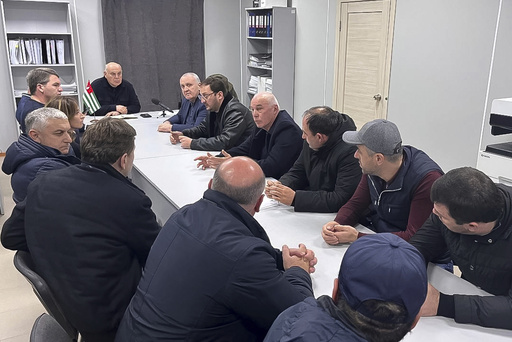
TBILISI, Georgia — On Tuesday, opposition demonstrators in Abkhazia, a separatist province of Georgia, appeared to reach a consensus with the regional government to bring an end to several days of turmoil. This unrest was characterized by the occupation of significant government buildings and resulted in at least 14 injuries during confrontations with law enforcement.
The protests ignited last Friday in response to newly enacted regulations that allow Russian nationals to purchase property in the attractive coastal area. During these protests, demonstrators demanded the resignation of Aslan Bzhania, the self-proclaimed president of Abkhazia. In a move toward resolution, Bzhania indicated he was willing to step down if the protesters retreated from the government buildings they had taken over. However, the opposition insisted that his resignation must happen first before they would relinquish control of the premises.
Reports from Russian state media suggested that on Tuesday morning, Bzhania, who has the support of Moscow, tendered his resignation as the opposition agreed to vacate the seized buildings. Abkhazian Vice President Badra Gunba mentioned that the agreement was reached after extensive negotiations lasting more than nine hours. While Bzhania’s resignation requires approval from the Abkhaz parliament, Gunba would assume the role of acting president in the interim.
Abkhazia declared independence from Georgia following a conflict that ended in 1993, and further tensions arose in 2008 during a brief war with Russia that resulted in Georgian forces losing control over the remaining territories. Although Russia recognizes Abkhazia as an independent entity, many in the region remain apprehensive about its status as a satellite state of Moscow.
Famous for its mountainous landscapes and picturesque Black Sea beaches, Abkhazia attracts a significant number of Russian tourists, which may enhance the demand for vacation properties in the area.
The protests escalated on Friday when clashes erupted between protestors and law enforcement, resulting in injuries. Reports from Russian state outlets indicated that as lawmakers convened to deliberate on new property regulations allowing Russian purchases, demonstrators broke through the gates of the parliamentary building and stormed inside. The situation intensified as some protestors threw stones at the police, who responded with tear gas to disperse the crowd.
Additionally, the earlier arrest of five opposition figures in a separate demonstration incited greater unrest, prompting masses to rally, blockading bridges leading into the capital city of Sukhumi the following day.
